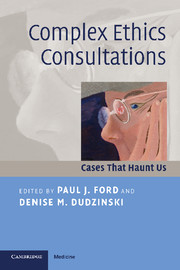Book contents
- Frontmatter
- Contents
- List of contributors
- Foreword
- Acknowledgments
- Introduction: Live and learn: courage, honesty, and vulnerability
- Part I Starting at the beginning: prenatal and neonatal issues
- 1 Quality of life – and of ethics consultation – in the NICU
- 2 When a baby dies in pain
- 3 But how can we choose?
- 4 Maternal–fetal surgery and the “profoundest question in ethics”
- Part II The most vulnerable of us: pediatrics
- Part III Diversity of desires and limits of liberty: psychiatric and psychological issues
- Part IV Withholding therapy with a twist
- Part V The unspeakable/unassailable: religious and cultural beliefs
- Part VI Human guinea pigs and miracles: clinical innovations and unorthodox treatment
- Part VII The big picture: organizational issues
- Conclusions, educational activities, and references
- Index
4 - Maternal–fetal surgery and the “profoundest question in ethics”
Published online by Cambridge University Press: 03 May 2010
- Frontmatter
- Contents
- List of contributors
- Foreword
- Acknowledgments
- Introduction: Live and learn: courage, honesty, and vulnerability
- Part I Starting at the beginning: prenatal and neonatal issues
- 1 Quality of life – and of ethics consultation – in the NICU
- 2 When a baby dies in pain
- 3 But how can we choose?
- 4 Maternal–fetal surgery and the “profoundest question in ethics”
- Part II The most vulnerable of us: pediatrics
- Part III Diversity of desires and limits of liberty: psychiatric and psychological issues
- Part IV Withholding therapy with a twist
- Part V The unspeakable/unassailable: religious and cultural beliefs
- Part VI Human guinea pigs and miracles: clinical innovations and unorthodox treatment
- Part VII The big picture: organizational issues
- Conclusions, educational activities, and references
- Index
Summary
Narrative
I am thinking about Rebecca, her mother, and her fetus. For several years now, I have periodically found myself remembering our last encounter. Perhaps it is more accurate to say that I revisit certain images, seeking to understand a signature moral problem.
Rebecca had traveled to our hospital seeking information about maternal–fetal surgery to repair fetal spina bifida. One of the most morally intriguing surgeries in medicine over the past decade, it has stimulated considerable controversy as well as the need to examine the complicated, contested, and serious ethical issues it raises. Some have argued, for example, that maternal–fetal surgery to repair fetal myelomeningocele should never be offered because it presents no medical benefit to the woman and not enough for the fetus. There is some truth to this position because there is a 12% risk of premature delivery under 30-weeks' gestation, including a 5% risk of fetal or neonatal demise. On the other hand, there has been sufficient indication of benefit to warrant a multi-center randomized clinical study funded by the National Institute of Child Health and Human Development to evaluate and possibly answer questions about the surgery's benefits. That study is currently open and ongoing.
I meet with all women considering maternal–fetal surgery at my institution to address the many ethical issues and controversies. In these meetings, I try to help family members anticipate, identify, and understand the many personal, medical, social, and ethical issues they will face whether or not they decide to have the fetal repair. Rebecca and her mother arrived when fetal repair was offered as an elective option. Accordingly, several identifiable moral factors deserve mention in Rebecca's case.
- Type
- Chapter
- Information
- Complex Ethics ConsultationsCases that Haunt Us, pp. 36 - 42Publisher: Cambridge University PressPrint publication year: 2008
- 3
- Cited by



